Mario Campana is a Lecturer in Marketing in the School of Management and has been at the University of Bristol since 2021. His research is focussed on consumer research and consumer culture theory specifically. His research programme is partly centred on diversity and inclusion, focusing on LGBTQ+ themes. We spoke to Mario about his recent work on RuPaul’s Drag Race and its place within LGBTQ+ brand history.
What is the main motivation behind your research areas?
 I started my PhD in a different area of research, looking at alternative economies. I think it was something like 2012, 2013, and I just came across RuPaul’s Drag Race. I got hooked to the point that I nearly stopped finishing my PhD! I watched all the series that were out there, and I kept watching it again and again and again!
I started my PhD in a different area of research, looking at alternative economies. I think it was something like 2012, 2013, and I just came across RuPaul’s Drag Race. I got hooked to the point that I nearly stopped finishing my PhD! I watched all the series that were out there, and I kept watching it again and again and again!
I hadn’t been to any drag shows before watching Drag Race. So, I really entered this world more socially rather than on any research perspective. What I really found interesting were the stories that they were telling on the show – the experience of being excluded, of being the outcast in school, of growing up at the margins. I found that these stories were resonating with me, and with other people within the LGBTQ+ community.
I found myself at a party, where two people were talking who were not LGBTQ+ and they were watching Drag Race as well, and these stories were also resonating with them! I found this interesting because when you look at the literature in Marketing, it says that the things that are for LGBTQ+ people are only for LGBTQ+ people, right?
So, how could Drag Race have achieved mainstream success, despite carrying the LGBTQ+ stigma? We are in a period where there is more, I would not say acceptance, because different letters in the spectrum are facing very different challenges, but at least a bit more legal legitimation of LGBTQ+ people. And while the challenges are still steep, you have this show that showcases drag queens and normalises them.
So, this is where the project started from. But as I started my research, other things came up too. I am now looking at, with other colleagues, the academic literature in marketing on LGBTQ+ people as consumers. We are trying to map the literature and look at underrepresented consumer segments. For example, transgender men and women or transgender people in general, who almost disappear when it comes to these studies, which are normally focused on white gay men in the Western Hemisphere.
Has Pride itself taken a similar route to Drag Race in becoming a mainstream brand?
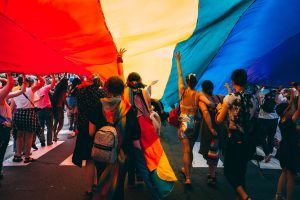 I am an advocate of Pride as a protest, I think that’s the function of Pride, rather than having a parade of corporate sponsorships. Effectively, as they became a brand, they also become more commercialized. I think Pride is a bit of a crossroad in terms of what it represents. Pride really has to reconfigure what they stand for.
I am an advocate of Pride as a protest, I think that’s the function of Pride, rather than having a parade of corporate sponsorships. Effectively, as they became a brand, they also become more commercialized. I think Pride is a bit of a crossroad in terms of what it represents. Pride really has to reconfigure what they stand for.
Will you be celebrating Bristol Pride this year?
So, I’m not sure I’ll be in Bristol for the march, but I celebrate Pride in general. You have to celebrate Pride if you can. Despite its identity crisis, Pride needs to be celebrated. The creation of visibility is always important.
Has the response to your research themes changed since you started looking into them and if so, how?
When we started the research, we were basically trying to show a case of a brand that was becoming mainstream, and we saw that there was more to it than that. So, we integrated this idea of stigma, and spectacles and trying to create visibility around this, the theme of the research has shifted since the beginning.
In terms of participants that we interviewed, it’s quite interesting to see. I thought that my experience with Drag Race was a shared experience, but then as we started to interview, we started seeing that this story really resonates with people that have had hardships in their lives. So, people that had less hardships, they somehow see less in the show.
Do you see a difference in responses to Drag Race, across different demographics?
 Yes, there are the very young people! Though we don’t yet have many of them in our research interviews. We have people more or less my age, that went through being in the closet when they were younger, that hardship there. And we’ve interviewed older people, who have been through the same thing, but they’re also really attracted to this fabulousness of drag queens!
Yes, there are the very young people! Though we don’t yet have many of them in our research interviews. We have people more or less my age, that went through being in the closet when they were younger, that hardship there. And we’ve interviewed older people, who have been through the same thing, but they’re also really attracted to this fabulousness of drag queens!
Another aspect is that I was very surprised how drag queens are cultural in the UK. A lot of older people, even non-LGBTQ+ people, have been to drag shows. They will watch RuPaul because they are familiar with drag shows. This gives them something in common with the younger demographic.
Who has been your favourite drag queen on the show?
Hands down Bianca Del Rio! But I have to say in the UK, Tia Kofi.
A big thank you to Mario for giving up his time to talk to us. If you would like to know more about how we are celebrating Pride please visit our Pride webpage. And if you have your own stories to share about Pride or being part of the LGBTQ+ community please get in touch: student-comms@bristol.ac.uk.
#BristolUniPride #BristolPride
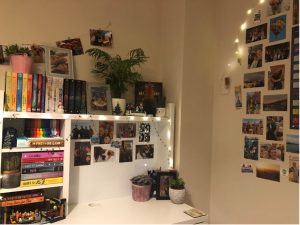 To make my uni room feel more homely, I like to bring plenty of stuff from home to decorate with (and sometimes I go a bit overboard). I have photos plastered all over my walls (using blue tack alternatives to not stain the walls of course), and my shelves are chocked full of books, plants, and Lego.
To make my uni room feel more homely, I like to bring plenty of stuff from home to decorate with (and sometimes I go a bit overboard). I have photos plastered all over my walls (using blue tack alternatives to not stain the walls of course), and my shelves are chocked full of books, plants, and Lego.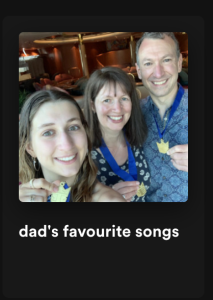 Music really helped me transition to university at the beginning of first year. Before moving into my accommodation in September, I spent some time putting some playlists together so that I could carry a bit of home with me wherever I went.
Music really helped me transition to university at the beginning of first year. Before moving into my accommodation in September, I spent some time putting some playlists together so that I could carry a bit of home with me wherever I went.


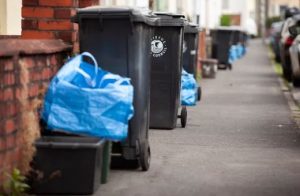 Steve: Yes I’ve come across that. But they can order new ones on the
Steve: Yes I’ve come across that. But they can order new ones on the 
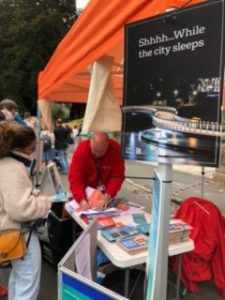 Steve: Definitely. Most of the residents’ associations run initiatives around gardening and litter picking – the
Steve: Definitely. Most of the residents’ associations run initiatives around gardening and litter picking – the 
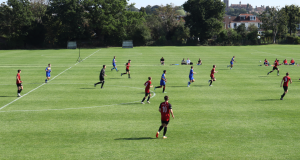 Leadership to me is more of an action than a status or title. I’m a huge football fan, so seeing my favourite players influencing the game, both on and off the pitch, taught me a lot about how I can be a leader in my own community and about what skills and qualities would help me achieve that! Firstly, it helped me acknowledge the differences between a leader (e.g. the captain) and a manager. A leader cares about their team and how they can extract the best out of everyone, vs a manager whose job is to make sure everyone fulfils their role and works towards a goal. Secondly, being true to your values in everything you do is important when maintaining integrity. Someone who demonstrates good leadership skills should act with integrity as that gives others the chance to understand their motives and intentions, thus enabling them to get behind or not.
Leadership to me is more of an action than a status or title. I’m a huge football fan, so seeing my favourite players influencing the game, both on and off the pitch, taught me a lot about how I can be a leader in my own community and about what skills and qualities would help me achieve that! Firstly, it helped me acknowledge the differences between a leader (e.g. the captain) and a manager. A leader cares about their team and how they can extract the best out of everyone, vs a manager whose job is to make sure everyone fulfils their role and works towards a goal. Secondly, being true to your values in everything you do is important when maintaining integrity. Someone who demonstrates good leadership skills should act with integrity as that gives others the chance to understand their motives and intentions, thus enabling them to get behind or not.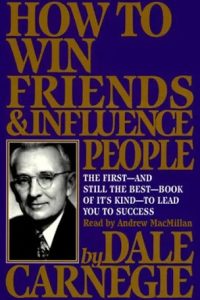


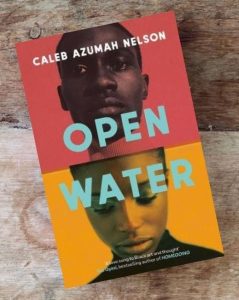
 I had a great time at university! I met Yomi and Aisha (the other co-founders of Black Mothers Matter) at an ACS (
I had a great time at university! I met Yomi and Aisha (the other co-founders of Black Mothers Matter) at an ACS ( We have two work streams, one of which directly engages members of the community by pairing women with doulas, providing antenatal support hampers and that kind of thing. The other project addresses systemic issues and includes an anti-racist
We have two work streams, one of which directly engages members of the community by pairing women with doulas, providing antenatal support hampers and that kind of thing. The other project addresses systemic issues and includes an anti-racist 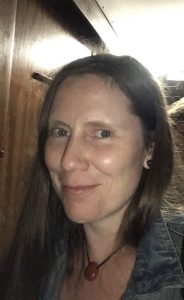 I did a master’s in social work at Bristol University and I guess my dissertation and work as a student social worker inspired me to do what I’m doing now. Alongside this, the project also stems from personal and professional experiences of male bias and seeing how this plays out time and time again in research, practice and day-to-day life.
I did a master’s in social work at Bristol University and I guess my dissertation and work as a student social worker inspired me to do what I’m doing now. Alongside this, the project also stems from personal and professional experiences of male bias and seeing how this plays out time and time again in research, practice and day-to-day life. It’s quite a few things really. Even though there is research that might talk about autistic women or autistic people, it might not even report on sexuality or race. If you just talk about the LGBTQ+ community specifically, research shows that mental health outcomes are poorer, and then you throw autism into the mix and it’s even poorer again. So yes, it would be great to raise awareness, not just about getting support, but knowing that the support is there. The funny thing is that although there’s all this medicalised talk going around with autism, the way you get a diagnosis is through behaviour. So it’s a very socially diagnosed label and a lot of people don’t realise they’re entitled to social care support.
It’s quite a few things really. Even though there is research that might talk about autistic women or autistic people, it might not even report on sexuality or race. If you just talk about the LGBTQ+ community specifically, research shows that mental health outcomes are poorer, and then you throw autism into the mix and it’s even poorer again. So yes, it would be great to raise awareness, not just about getting support, but knowing that the support is there. The funny thing is that although there’s all this medicalised talk going around with autism, the way you get a diagnosis is through behaviour. So it’s a very socially diagnosed label and a lot of people don’t realise they’re entitled to social care support.
 I started my PhD in a different area of research, looking at alternative economies. I think it was something like 2012, 2013, and I just came across RuPaul’s Drag Race. I got hooked to the point that I nearly stopped finishing my PhD! I watched all the series that were out there, and I kept watching it again and again and again!
I started my PhD in a different area of research, looking at alternative economies. I think it was something like 2012, 2013, and I just came across RuPaul’s Drag Race. I got hooked to the point that I nearly stopped finishing my PhD! I watched all the series that were out there, and I kept watching it again and again and again! I am an advocate of Pride as a protest, I think that’s the function of Pride, rather than having a parade of corporate sponsorships. Effectively, as they became a brand, they also become more commercialized. I think Pride is a bit of a crossroad in terms of what it represents. Pride really has to reconfigure what they stand for.
I am an advocate of Pride as a protest, I think that’s the function of Pride, rather than having a parade of corporate sponsorships. Effectively, as they became a brand, they also become more commercialized. I think Pride is a bit of a crossroad in terms of what it represents. Pride really has to reconfigure what they stand for.  Yes, there are the very young people! Though we don’t yet have many of them in our research interviews. We have people more or less my age, that went through being in the closet when they were younger, that hardship there. And we’ve interviewed older people, who have been through the same thing, but they’re also really attracted to this fabulousness of drag queens!
Yes, there are the very young people! Though we don’t yet have many of them in our research interviews. We have people more or less my age, that went through being in the closet when they were younger, that hardship there. And we’ve interviewed older people, who have been through the same thing, but they’re also really attracted to this fabulousness of drag queens!
 I think that, within academia, there is a real appetite for understanding how laws, social structures and cultural practices negatively impact the lives of LGBTI+ populations. In recent times, the UK, particularly our different funding bodies, has been good in terms of providing resources for LGBTI+-focused research, and in encouraging and creating relevant conversations within academic spaces. At present, there are numerous academics across the UK who are undertaking really important studies into the lives and experiences of LGBTI+ communities.
I think that, within academia, there is a real appetite for understanding how laws, social structures and cultural practices negatively impact the lives of LGBTI+ populations. In recent times, the UK, particularly our different funding bodies, has been good in terms of providing resources for LGBTI+-focused research, and in encouraging and creating relevant conversations within academic spaces. At present, there are numerous academics across the UK who are undertaking really important studies into the lives and experiences of LGBTI+ communities.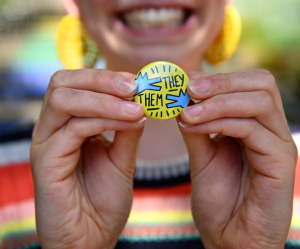
 In the first of this week’s blogs focusing on research we are talking to the vibrant Dr Sarah Jones, a lecturer and researcher in the Department of History. Dr Jones’ teaching in
In the first of this week’s blogs focusing on research we are talking to the vibrant Dr Sarah Jones, a lecturer and researcher in the Department of History. Dr Jones’ teaching in 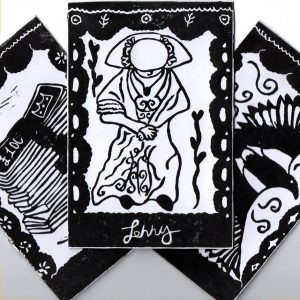 The big motivation behind the Jenny project is the fact that queer histories, and especially trans histories, are often told through what we would consider regulatory bodies, so we tend to hear about people when they’re arrested, or oppressed in some way, or when horrible things are happening to them. And that’s obviously a really important thing to look at and understand, but it also means that you don’t really get that much of a sense of these people as real, living people. History has often tended to focus on victimisation, oppression, and persecution – what Tom (Marshman) wanted to do is think about different ways we could look at the archive and build a more rounded, human story about someone like Jenny. Just a wonderfully complicated person living a complicated life in a complicated moment.
The big motivation behind the Jenny project is the fact that queer histories, and especially trans histories, are often told through what we would consider regulatory bodies, so we tend to hear about people when they’re arrested, or oppressed in some way, or when horrible things are happening to them. And that’s obviously a really important thing to look at and understand, but it also means that you don’t really get that much of a sense of these people as real, living people. History has often tended to focus on victimisation, oppression, and persecution – what Tom (Marshman) wanted to do is think about different ways we could look at the archive and build a more rounded, human story about someone like Jenny. Just a wonderfully complicated person living a complicated life in a complicated moment. 